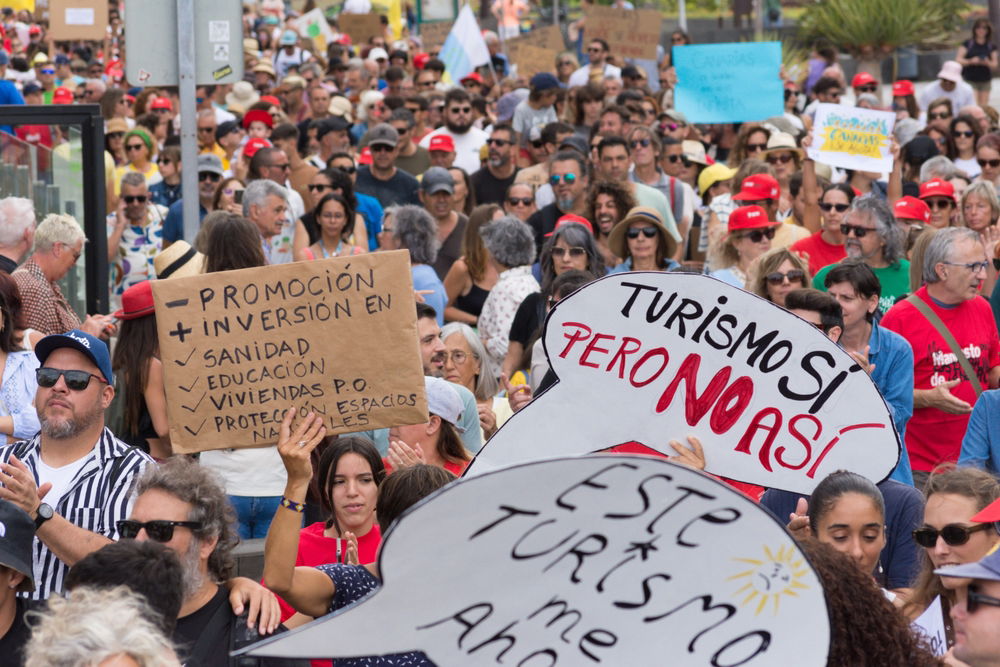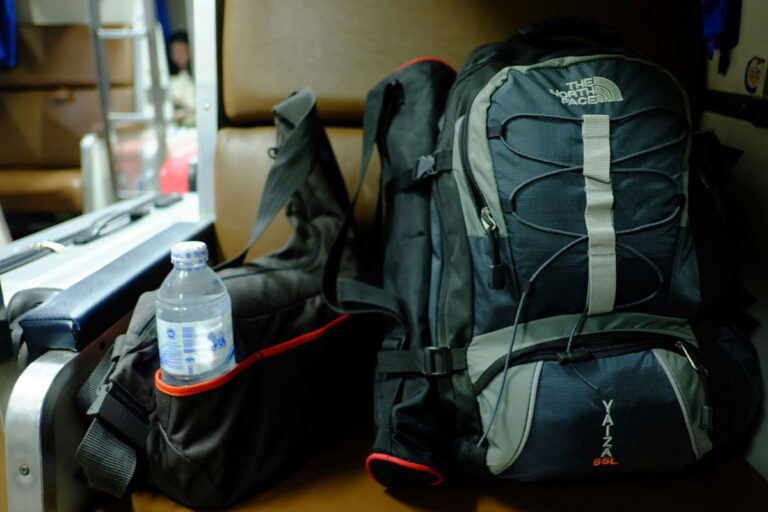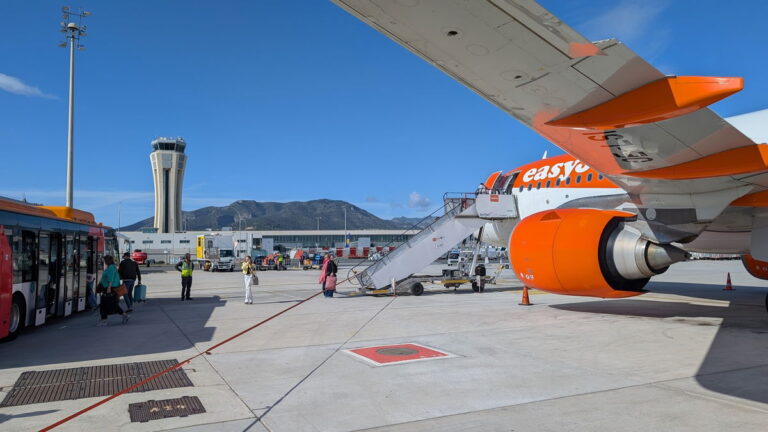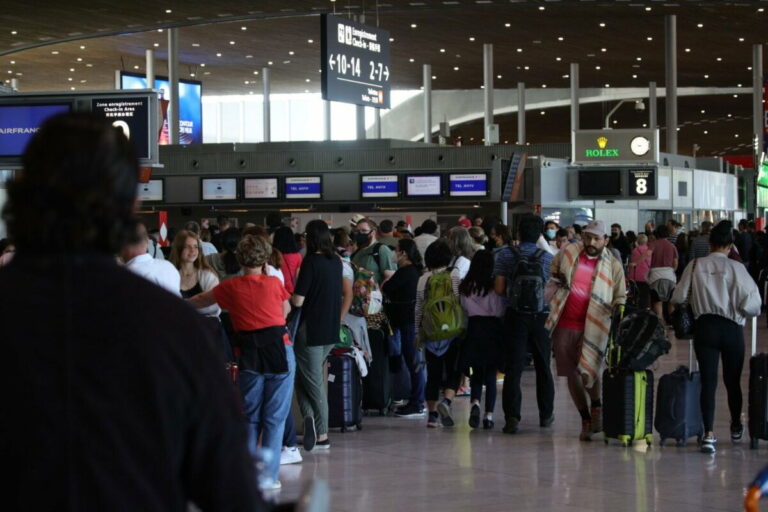
Fed up in the Canaries – Protesters in Arrecife, Lanzarote took to the streets in April 2024 over mass tourism. A year later, the pressure’s still on with nationwide protests.Credit: Magdalena Rydz, Shutterstock
We’ll save you the reading. The answer is no. Spain is not targeting foreigners or tourists. Read on if you’d like to find out why!
In a dramatic bid to cool Spain’s spiralling housing crisis, Prime Minister Pedro Sanchez has unleashed a barrage of reforms targeting tourist hotspots like Malaga, Seville, and Barcelona – all of which have seen rents surge and residents pushed out in recent years.
As previously reported by the Euro Weekly News, from this month, residents living in apartment blocks can vote to ban holiday lets from their building altogether – with just 60% of neighbours needed to give short-term rentals the boot. The new legislation means that even a single property owner in a community could be stopped from renting out their flat to tourists if others complain about noise or disruptions.
Meanwhile, Airbnb and other platforms are firmly in the government’s crosshairs. They’re facing potential multi-million euro fines for hosting unlicensed properties, with Sánchez accusing the industry of fuelling the problem.
‘There are too many Airbnbs and not enough housing,’ the Spanish PM declared earlier this year, as he vowed to clamp down on what he described as non-EU speculation pricing out the country’s youth.
A nation on edge: from protests to policies
Sánchez’s words came after years of soaring property prices, which have doubled in some regions over the last decade. Fed-up locals have taken to the streets in droves. In April, more than 40 cities, including Palma, Malaga and Barcelona, saw mass protests demanding action on unaffordable rents and ‘binge-drinking tourism’.
Signs reading ‘And now they want our houses’ were hoisted in Barcelona – a city where nearly 6,000 illegal rentals have been shut down since 2014. Many argue that Airbnb should be severely restricted or banned altogether so that tourists who do want to visit have to stay in hotels. Others argue that Spain is already moving away from mass lads on tour tourism and towards more premium tourists, much like Italy and France. But it’s irrelevant at the moment. The problem is still there, with inspectors still uncovering around 300 dodgy flats every month.
Housing crisis reaches boiling point in Malaga
In Malaga, things have reached boiling point. The city’s picturesque old town, including the once-affordable La Merced district, has seen rents double since 2016, according to a report by Malaga University and the Andalusian Institute for Research and Innovation in Tourism (IATUR). In districts where tourist flats make up 10% of the housing stock, rents have shot up by over 30% in just seven years.
As a result, Malaga has slapped a three-year moratorium on new holiday rental licences. The move follows a similar freeze in November, which banned short-term lets in the city’s most saturated neighbourhoods.
Turning off the tap – literally
Seville has gone even further – with the city council now able to cut off water supply to illegal rentals. It’s an aggressive tactic reflecting growing frustration at housing being gobbled up by deep-pocketed landlords and investment funds.
A report commissioned by Spain’s Ministry of Consumer Affairs found that the majority of tourist rentals are now run by large and medium-sized property owners, not locals looking to earn a bit of extra income. This flies in the face of how the holiday let boom began – with spare rooms and part-time rentals.
‘Tourist apartments are no longer predominantly run by people seeking extra income; in many cases, they are large and medium-sized private owners or investment funds,’ the report concludes.
Capital conflict: Madrid under fire
In Madrid, things are even starker. Just 1,130 of the city’s holiday rentals are legally registered, while an estimated 15,300 operate under the radar. Consumer Affairs Minister Pablo Bustinduy, from the Left-wing Sumar party, has accused the city’s conservative mayor of turning a blind eye to the chaos. Hotels are also up in arms at what they see as unfair competition from businesses that don’t follow the rules.
His department has already begun sanctioning tourism platforms for advertising illegal properties. Some platforms now face charges of “false advertising” by presenting properties as private rentals when they’re actually operated by companies.
Airbnb hits back
Airbnb isn’t taking it lying down. The holiday rental giant hit back, saying it’s been unfairly made a “scapegoat” for Spain’s housing crisis – and warned that tough new rules could put €30 billion in annual tourism at risk.
But critics say it’s about time. They argue that closing down illegal flats will ease the housing crunch for locals – and force tourists back into proper hotels. And once that happens, hotel prices are expected to rise, helping Spain shift from budget booze breaks to a more profitable, premium tourism model – like France and Italy.
But with thousands of young Spaniards priced out of their own cities and angry protests erupting across the country, it seems the government is dragging its feet.
Brits bite back?
While Spaniards march, some Brits are snapping. One annoyed traveller wrote online: ‘If Spain doesn’t want us, we’ll go to Crete this year!’ Others made digs about Spain ‘having no industry’ if tourists take their euros elsewhere.
But behind the online rants is a deeper question: are these protests rooted in anti-tourist or even anti-foreigner sentiment?
The short answer? Not really.
Spain: land of tapas and tolerance, or protests and frowns?
Despite headlines about a “100% tax on foreign home buyers” or the scrapping of the so-called “Golden Visa” scheme, Spain continues to roll out red carpets for many newcomers. Digital nomad visas are booming, and the government has streamlined ways for undocumented migrants to legalise their status and join the workforce.
Why? Economics.
Spain’s economy grew five times faster than the EU average last year, fuelled by – wait for it – tourism and immigration. Unemployment is now the lowest since 2007, with 90% of new jobs filled by foreign-born workers.
Even among locals, attitudes remain balanced. A 2024 survey found that 66% of Spaniards want better tourism management – but not fewer tourists. Another revealed that while 30% listed immigration as a concern, the vast majority described day-to-day interactions with immigrants as positive.
So, should you still book?
Absolutely – ignore the headlines. Just leave the entitlement at home and pack some empathy alongside your sun cream. This is not about tourists, it’s about big businesses and politicians.
This is a nation built on hospitality, good wine, and social protest. The signs in the street might look scary, but most of them aren’t aimed at you. They’re doing their own headlines for shock value. They’re a cry for help – for affordable homes, better planning, and a more sustainable way forward.
If you show up with curiosity, kindness, and a few words of Spanish – you’ll likely get a smile, a kiss on the cheek, and maybe even a slice of cake.
Read news written for people living in Spain.
Read more Spanish news in English.







